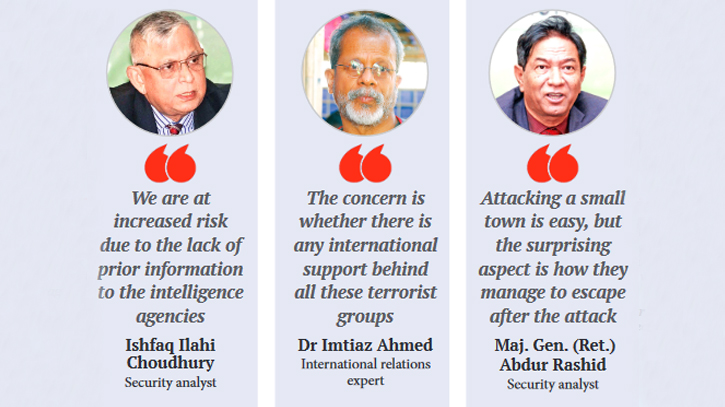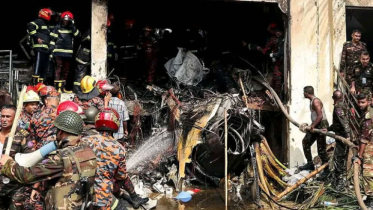
Photo : Messenger
Bandarban has been struck by terrorist attacks, instigating fear among the populace. Following attacks in Ruma and Thanchi upazilas of Bandarban district, armed terrorists targeted a joint checkpoint of Alikadam police station and army late Thursday night. Unfortunately, due to the apparent inability to resist, 14 weapons and 415 bullets were surrendered to the terrorists.
Security analysts have voiced concerns that Bangladesh faces heightened security risks after terrorists targeted small towns and managed to evade capture. They argue that amidst the backdrop of polarised politics, various dynamics are at play in Bangladesh's domestic and international political arena. Hence, it's essential to scrutinise if there's any international instigation behind the attacks.
Furthermore, authorities need to investigate why the intelligence agencies were not aware of such a significant incident beforehand. Additionally, it's crucial to analyse how the terrorists were able to escape after attacking small towns and identify the current weaknesses in law enforcement forces.
Expressing grave concern over the ongoing attacks, looting, and clashes in Bandarban Security analyst Air Commodore (retired) Ishfaq Ilahi Choudhury told the Daily Messenger. He emphasised that the primary issue lies in the weakness of the intelligence agencies. The frequent attacks on police stations, bank robberies, and weapon thefts, coupled with the lack of prior intelligence, are increasing the country's security risks.
Moreover, Air Commodore Ishfaq Ilahi highlighted the alarming trend of minimal casualties despite the looting of weapons from security forces. He likened the situation to a scenario where separatists could demand arms without facing resistance. This growing trend necessitates urgent investigations to closely scrutinise the shortcomings in both intelligence agencies and administrative structures.
Professor Dr. Imtiaz Ahmed, an international relations expert and security analyst, shared insights with Daily Messenger, emphasising the complexity of the recent attacks in Bandarban. He stressed the importance of examining if there are local or external forces at play, as the situation involves numerous national and international factors.
Dr. Ahmed underscored the necessity of thorough investigation supported by evidence, particularly focusing on national issues. He raised questions about the lack of prior intelligence messages or warnings and suggested exploring potential connections with various groups in the region, including those in conflict with India and possibly Myanmar.
Moreover, Dr. Ahmed expressed concerns about the potential involvement of international actors behind these groups and highlighted the intricate dynamics of global politics, including the polarisation of global politics. He emphasised the need for careful analysis to determine the true orchestrators behind these incidents, given their direct implications for national security.
Security analyst Major General (retired) Abdur Rashid, in a statement to Daily Messenger, expressed perplexity over the continued silence of the army despite the ongoing attacks by separatist groups. He highlighted the varying tactics employed by the attackers, noting that they operate both as separatists and as trained armed forces.
Major General Rashid pointed out the ease with which these attackers target small towns and evade capture, raising concerns about the weaknesses within the security forces responsible for protecting citizens. He emphasised the urgent need to investigate and address these weaknesses to prevent further risks, particularly the increased vulnerability of forces when attacked by terrorist groups in small towns.
Messenger/Disha








